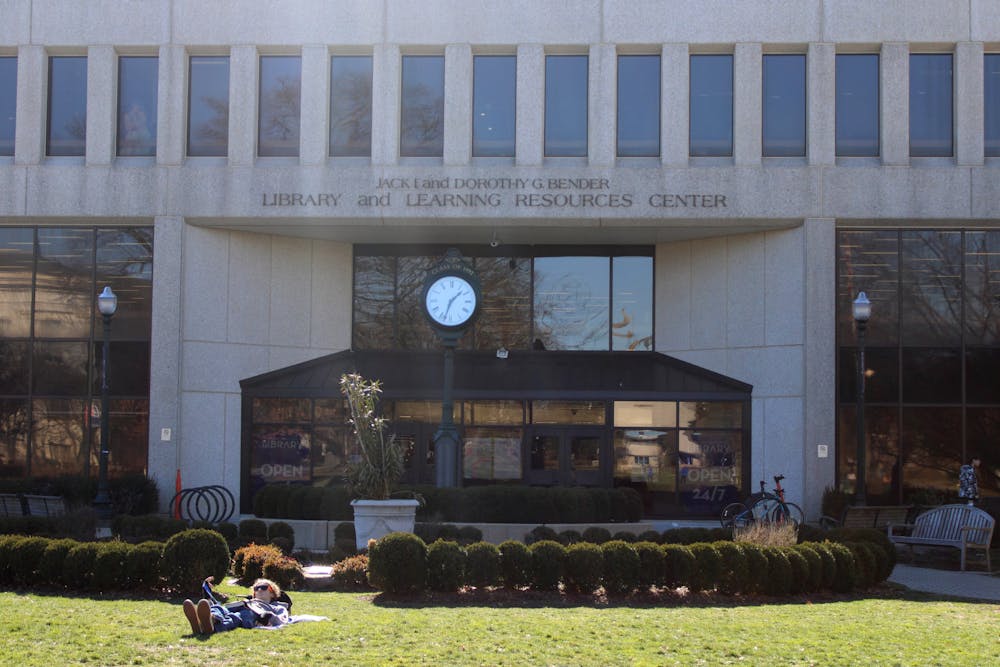This story contains descriptions of sexual abuse and may be upsetting to some readers. Please see the bottom of this story for additional resources.
An American University student was arrested and charged with voyeurism after allegedly taking video footage of an unidentified individual on July 22 in the Bender Library second-floor men’s restroom, according to documents filed by police in D.C. Superior Court.
Kris Emmanuel Estrada, who has since pleaded not guilty, turned himself in to the AU Police Department on Aug. 1 after he was reported missing on July 28 by his friends who last had contact with him on July 25. The University said in a July 28 email that they were “aware of unconfirmed reports” of a potential missing student. The University said in another email a day later that Estrada was reported “safely located.”
This is the third incident where an AU student was arrested on D.C. voyeurism charges in recent years. Two of these arrests have taken place in the last three months. AU student Markus Huerta was arrested on unrelated charges of voyeurism in May, while former AU student Kyle Blanco was sentenced in April in an unrelated Spring 2022 case on voyeurism and possession of child sexual abuse materials charges while enrolled at AU.
The Eagle discovered Estrada’s arrest in the AUPD daily crime log. The arrest had not been previously reported.
Matthew Bennett, University vice president and chief communications officer, said in a statement to The Eagle that “voyeurism—like all other crimes—is unacceptable on our campus.”
The University did not notify students of the reported crimes in either email regarding Estrada’s whereabouts. Bennett said, “At no time in this matter was there an imminent or continuing threat to campus safety” when determining whether the University would notify students under the Clery Act, a law requiring campus administrators to report what they see as serious or ongoing threats.
“Given unconfirmed public reports, it was appropriate to update the community about our engagement to determine the facts of the situation and when the student was located,” Bennett said. “During this period, the university worked closely with law enforcement and the student’s family to provide support. The focus was on safely locating the student.”
AUPD found “approximately” seven videos “taken without the victim’s knowledge or consent” on Estrada’s iPhone during an electronic search on July 26 after obtaining a warrant, according to an affidavit by AUPD Detective Joseph Barnes. The affidavit is a sworn statement establishing probable cause for Estrada’s arrest.
The videos, which had been “recently deleted,” depicted the individual “sitting down and actively using the toilet,” Barnes wrote in the affidavit.
The individual spoke to AUPD on July 22, alleging that while he was using the restroom at approximately 11:30 a.m., a person walked into the neighboring stall and stood facing the toilet for three to four minutes before the individual noticed a dark-colored phone over the top of the back left portion of his own stall, which was quickly pulled straight down.
After another minute, the individual said he finished using the bathroom, walked past some bookshelves, and faced the bathroom to see who the person recording was. He was unable to see who it was before leaving for the first floor where he initially reported the incident to a library employee.
After reviewing video footage of Bender Library on the morning of July 22, Barnes recognized the defendant as Estrada “based on a prior investigation involving an individual that matched the physical description” of the suspect, the affidavit says. The shoes Estrada was wearing in the footage also matched the description the individual gave of the shoes the person recording in the bathroom stall was wearing. American University’s Wi-Fi information associated with Estrada’s account also revealed his cell phone was on the second floor of Bender Library around the time of the incident.
Barnes searched Estrada’s room in Constitution Hall on July 25. He confiscated one dark-colored iPhone with a dark purple case, which he said Estrada voluntarily provided the password for. July 25 was the day Estrada’s friends said they last had contact with him when they reported him missing via social media a few days later.
The phone matched the description that the individual gave of the phone recording him in the bathroom as well as pictures of Estrada’s phone on his Instagram account.
All of the seven recently deleted video files on Estrada’s phone depicted the individual who reported the incident and who “had a reasonable expectation of privacy,” according to the affidavit.
Court documents filed after Estrada’s release have banned him from AU’s campus. An initial misdemeanor status hearing for Estrada is scheduled for Sept 6. Estrada’s attorney declined a request to comment when reached by The Eagle.
“We are committed to working with the community to ensure a culture of safety, educate about our safety measures, and develop specific information about preventing voyeurism and protecting privacy,” Bennett said.
Students who have experienced sexual assault or harassment can seek support through confidential resources such as the University’s Center for Well-Being Programs and Psychological Services, the Student Health Center, the Kay Spiritual Life Center or the following hotlines:
- Collegiate Assistance Program: 1-855-678-8679
- Rape, Abuse, Incest, National Network (RAINN) anonymous chat
- RAINN hotline: 1-800-656-4673
- DC Rape Crisis Center: 202-333-7273
Non-confidential resources include the University’s Title IX Office and AUPD.
This article was edited by Sydney Hsu, Tyler Davis and Abigail Turner. Copy editing done by Luna Jinks.





